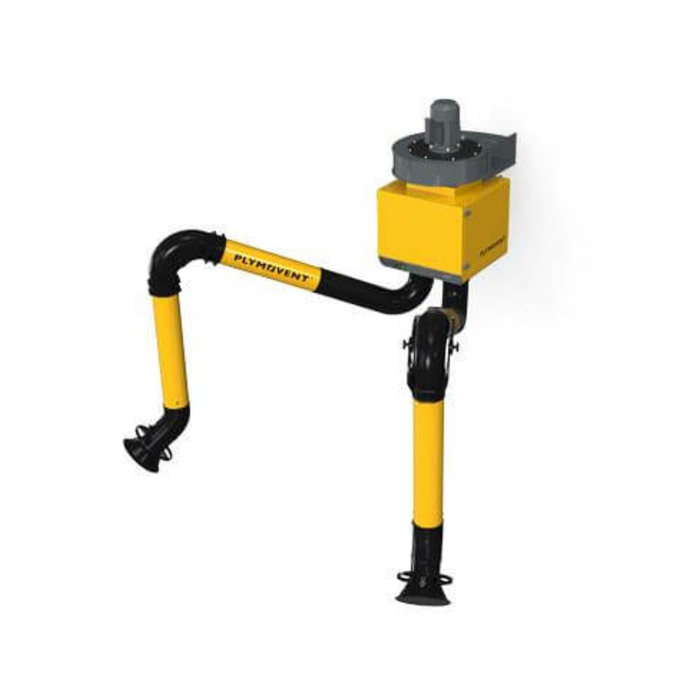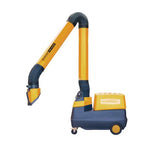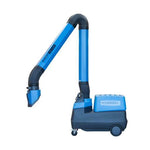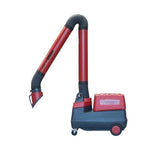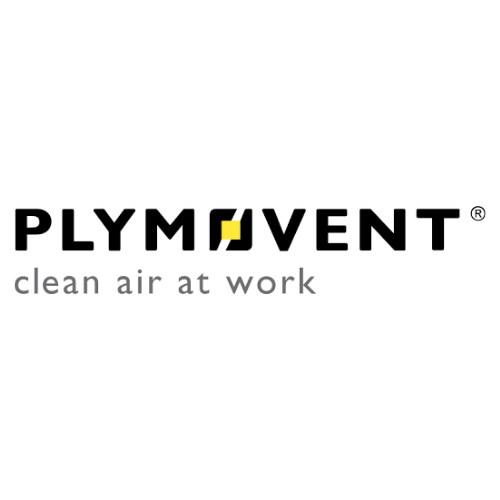dust, filtration, ventilation, welding, dust collector, metal, occupational safety and health, productivity, plasma cutting, hexavalent chromium, risk, stainless steel, laser, vacuum, airflow, cartridge, manufacturing, machine, energy, exhaust gas, chromium, plasma, laser cutting, steel, gas metal arc welding, soldering, manganese, energy conservation, hepa, lung, carbon, safety, arc welding, indoor air quality, nozzle, automation, extractor, contamination, hose, vacuum cleaner, hazard, lung cancer, oil, metalworking, pollution, noise, regulatory compliance, carcinogen, aluminium, concentration, workstation, nickel, irritation, breathing, food processing, plug and play, regulation, welding smoke eater, welding exhaust fan, welding smoke extractor, welding exhaust hood, welding fume hood, miller filtair 130, portable smoke extractor, lincoln smoke extractor, smoke extractor for welding, portable welding smoke extractor, fume extraction system, welding fume extraction system, exhaust fan welding, portable welding fume extractor, particulates, cart, minimum efficiency reporting value, ventilator, activated carbon, sale price, request a quote, equipment, add to cart, lincoln electric, spot welding, wire, construction, metal fabrication, customer, electrode, vehicle, engine, plastic, oxide, smoke extractor portable, solder, air purifier, fume hood, solvent, fume extractor, diameter, laboratory, solution, carbon steel, electronics, fume hoods, skip to content, fume extractor arms, units, welding booth, welding fume extraction, estimated total, portable fume extractor, portable fume extractors
Do fume extractors work?
Fume extractors are effective at removing harmful fumes, smoke, and particles generated during welding. By maintaining a cleaner work environment, they help ensure the safety and health of welders and compliance with workplace regulations.
How do portable recirculating welding fume extractors protect welders?
Portable recirculating welding fume extractors protect welders by effectively capturing harmful fumes and particulate matter produced during welding. This ensures a safer work environment, minimizing exposure to hazardous substances and enhancing overall air quality.
How does a welding fume extractor work?
A welding fume extractor works by capturing harmful fumes and particles generated during the welding process. It uses a series of filters and fans to draw in contaminated air, cleaning it before releasing purified air back into the workspace.
Do you need a fume extractor for welding?
A fume extractor is essential for welding to ensure a safe working environment. It effectively removes harmful fumes and particles, protecting welders from respiratory issues and enhancing overall air quality in the workspace.
Are welding fumes harmful?
Welding fumes are harmful as they contain toxic metals and gases that can cause respiratory issues, nervous system damage, and other health problems. Proper ventilation and fume extraction systems are essential for ensuring a safe working environment.
Are welding fumes toxic?
Welding fumes are indeed toxic. They contain harmful substances that can pose serious health risks if inhaled, making effective fume extraction essential for a safe working environment.
Are welding fumes hazardous?
Welding fumes are indeed hazardous. They can contain harmful substances that pose health risks, including respiratory issues and long-term exposure effects. Proper ventilation and effective fume extraction systems are essential for maintaining a safe working environment.
What features enhance fume extractor efficiency?
Features that enhance fume extractor efficiency include high airflow rates, multi-stage filtration systems, adjustable capture arms, and low noise operation, all of which ensure optimal removal of harmful welding fumes and create a safer workspace.
How often should fume extractors be serviced?
Fume extractors should be serviced regularly to ensure optimal performance and safety. It’s recommended to service them at least once a year, or more frequently in high-use environments, to maintain efficiency and prolong equipment lifespan.
What is the lifespan of a fume extractor?
The lifespan of a fume extractor typically ranges from 5 to 15 years, depending on usage, maintenance, and the quality of the unit. Regular care can extend its longevity significantly.
Can a fume extractor be used indoors?
Fume extractors can be used indoors to effectively remove harmful fumes and particulate matter generated during welding. They are designed to enhance workplace safety by maintaining clean air quality in enclosed environments.
What types of fume extractors are available?
There are several types of fume extractors available, including portable fume extractors, wall-mounted units, and industrial fume extraction systems, each designed to efficiently capture and filter harmful welding fumes from various work environments.
What safety standards apply to fume extractors?
The safety standards that apply to fume extractors include those set by organizations like OSHA (Occupational Safety and Health Administration) and CSA (Canadian Standards Association). These standards ensure fume extractors effectively manage hazardous fumes, promoting workplace safety.
How to select a fume extractor for welding?
Selecting a fume extractor for welding involves considering your workspace size, the type of welding you'll be doing, and the extractor's filtration efficiency. Ensure it meets safety standards and is compatible with your equipment for optimal performance.
What are the benefits of portable fume extractors?
The benefits of portable fume extractors include improved air quality by effectively capturing harmful fumes and contaminants, enhanced worker safety, and versatility in being moved easily across various job sites, making them essential for efficient welding practices.
What maintenance is required for fume extractors?
The maintenance required for fume extractors includes regular filter cleaning or replacement, checking for any blockages in hoses and ducts, and ensuring the fan is functioning properly. Regular inspections will also help to prolong the lifespan and efficiency of the unit.
How do fume extractors improve air quality?
Fume extractors improve air quality by effectively removing harmful welding fumes, gases, and particulate matter from the workspace. This ensures a safer environment for workers, reducing the risk of respiratory issues and promoting overall health.
What are the signs of a failing fume extractor?
The signs of a failing fume extractor include reduced airflow, unusual noises, persistent odors, increased welding fumes in the workspace, and frequent system shutdowns. Address these issues promptly to maintain a safe and efficient welding environment.
Can a fume extractor reduce health risks?
Fume extractors can significantly reduce health risks by effectively removing harmful welding fumes and gases from the workspace. This promotes a safer environment, minimizing exposure to toxic substances that can cause respiratory issues and other health problems.
Is noise a concern with fume extractors?
Noise can indeed be a concern with fume extractors. While some models operate quietly, others may produce significant sound levels, potentially affecting comfort in the workspace. It's essential to choose a unit that balances effective fume extraction with manageable noise levels.
How effective are fume extractors in small spaces?
Fume extractors are highly effective in small spaces, as they efficiently remove harmful welding fumes and particles, ensuring a safer working environment. Their compact design allows for targeted filtration, making them ideal for limited areas.
What power sources do fume extractors require?
Fume extractors require various power sources, typically electric or battery-powered options, depending on the model and application. It's important to check the specifications to ensure compatibility with your workspace's power supply.
How do recirculating fume extractors differ from others?
Recirculating fume extractors differ from other types by filtering and purifying air before releasing it back into the workspace, rather than exhausting it outside. This makes them ideal for environments where exhaust ventilation is impractical.
What accessories are available for fume extractors?
Accessories available for fume extractors include hoses, filters, capture hoods, and ducting components. These accessories enhance the efficiency and effectiveness of fume extraction systems, ensuring optimal air quality and safety in welding environments.
Can fume extractors handle all types of fumes?
Fume extractors are designed to handle a variety of fumes, but not all types. They are most effective for welding and metalworking fumes, while specialized systems may be needed for other hazardous substances.
What are common misconceptions about fume extractors?
Common misconceptions about fume extractors include the belief that they are only necessary for large-scale operations, and that all models effectively eliminate all types of harmful fumes. In reality, even smaller setups benefit greatly from these systems, and selecting the right extractor is crucial for optimal safety and efficiency.
Are there portable options for fume extraction?
Portable options for fume extraction are available. These compact systems are designed for easy mobility, allowing welders to maintain a safe and clean environment wherever they work.
How do environmental conditions affect fume extractor performance?
Environmental conditions significantly affect fume extractor performance. Factors such as temperature, humidity, and airflow can influence the efficiency of extraction systems, impacting their ability to remove harmful fumes effectively from the workspace.
What regulations govern fume extractor use in Canada?
The regulations governing fume extractor use in Canada primarily include the Occupational Health and Safety Act (OHSA) and guidelines set by provincial agencies. These regulations require effective ventilation and air quality measures to ensure worker safety in welding environments.
How can fume extractors enhance welding quality?
Fume extractors enhance welding quality by removing harmful fumes and particulate matter from the workspace. This not only improves visibility and air quality but also reduces the risk of defects and health hazards, resulting in cleaner and safer welds.
welding fume extractor, fume extractor, portable welding fume extractor, smoke extractor

